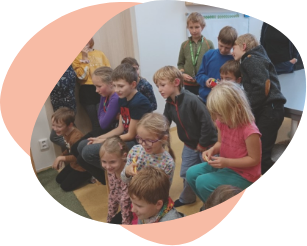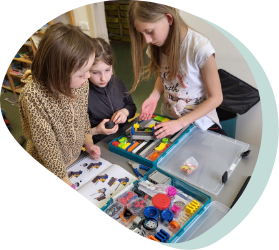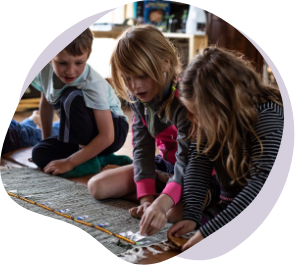Zahrada Elementary School
Space for growth of our children
We create a learning environment where children discover their potential. We are a community supported school based on Montessori principles. A school where everyone learns fully and enthusiastically.
We believe that children are responsible for their own learning process and that the teacher is a guide on the path of education. We base learning on our own experience and an open and safe environment. We strive to transform education by finding our own path.
Philosophy of the school
In ZaHRAda we define together where we want to go
About Montessori
At ZaHRAda, we believe it is possible to create an environment for children that will naturally benefit them and help meet their needs. That is why we follow the principles of Montessori pedagogy.
- We take an individual approach to each child.
- We take advantage of a child’s sensory periods, which represent the optimal time with the greatest potential to develop any of their abilities or skills.
- We create a prepared environment, both in terms of space (order and peace), material equipment (tools, facilities) and relationships in the school (between guides and children, between children).
- We move from the concrete to the abstract and equip the school with specially developed tools.
- We do not interrupt the child’s work. Children have the opportunity to find the activity that interests them most and then immerse themselves in it. Teaching time is not divided into lessons, is very flexible and includes significant space for free work.
- Children have the opportunity for natural movement. They can move freely, they can choose the place that suits them for their work. They take breaks from work (including meals) as they need them.
- We’re working with a mistake. Error is seen as a normal, natural occurrence in the learning process, a useful part of problem solving and a rich source of new knowledge. We do not focus on errors; the guide does not usually correct them, but works with them. The materials and aids are prepared so that the children can check the correct solution, find and correct the error themselves – their own mistakes help further learning.
- We consciously work with evaluation. We use descriptive language and a formative approach. Our goal is for children to do what is intrinsically fulfilling and not to do work to satisfy an adult’s fantasy or for praise.
- We teach in mixed age groups. Children work together in three-year cycles. This environment encourages cooperation, care and communication. Older children care for and teach the younger children, which also helps them to improve their own skills. The children find themselves in a different role each year. In a mixed classroom, diversity becomes the norm, which helps the principle of not comparing children to each other and providing security for each in their individual development.
How does it work in our school?
Individual classes are named after trees. According to the Montessori principle, we teach in three-year cycles, with mixed-age teams in each class.
The first three-year cycle (grades 1-3) has two parallel classes, Apple tree and Cherry tree.
The second three-year cycle (grades 4-6) also has two parallel classes of Hazel and Chestnut.
The third three-year cycle (grades 7-9) has only one class named Birch so far.
The workplace in Nedvědice has one class where both the first and the second three-year cycles are taught together, called Jasan.
The first three-year cycle
Apple Tree and Cherry Tree

The second three-year cycle
Hazel and Chestnut

The third three-year cycle
Birch

Nedvědice
Jasan

Volunteers
We care about the international context of the school and we always involve several volunteers from different countries. Some of them help in the classrooms, others in the after-school club. Those who are good tutors are involved in foreign language teaching.
.



